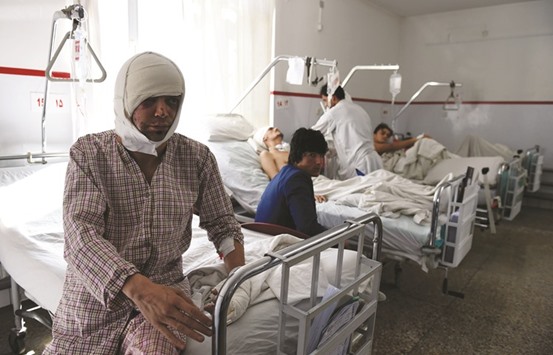Afghan mourners held emotionally charged funeral ceremonies yesterday for seven employees of leading national TV channel Tolo who were killed in a Taliban suicide bombing, which rights groups denounced as a “war crime”.
Tearful tributes poured in for the workers, including three women, who were killed Wednesday for what the Taliban said was revenge for “spreading propaganda” against the insurgent group.
The assault on Tolo, a privately run news and entertainment station often critical of the militants, marks the first major attack on an Afghan media organisation since the Taliban were ousted from power in 2001.
Shrouded in black, senior officials paid mournful tributes in a Tolo studio with flower-bedecked portraits of the seven victims, mostly behind-the-scenes staff from the channel’s graphics and dubbing departments.
“This was not just an attack on Tolo, but an attack on journalism,” Abdul Bari Jahani, minister of information and culture, said during the memorial service which was broadcast live.
The attack came just months after the group declared Tolo and 1TV, another private news channel, as legitimate “military targets”.
The edict was in response to their reports claiming that Taliban fighters raped women at a female hostel in Kunduz, after the group briefly captured the northern city in late September last year.
The Taliban rejected the reports as fabrications, saying they were examples of propaganda by the “satanic networks”.
At a tearful funeral service of 28-year-old Tolo video editor Jawad Hussaini, who was killed in Wednesday’s attack, his family lashed out at the Taliban.
“Jawad’s sister is an army officer and you (Taliban) must know that she will take revenge for his brother,” said his brother, Waseq Hussaini.
The deadly assault spotlights the dangers faced by media workers in Afghanistan, as the security situation worsens amid a growing wave of militant attacks.
“The targeting of journalists reflects a depraved strategy to make media freedom a casualty of the ongoing conflict,” Human Rights Watch said in a statement.
“Designating journalists and other civilians as ‘military targets’ does not make them so, and deliberately attacking them constitutes a war crime.”
Independent media outlets, banned by the Taliban during their 1996-2001 rule, have mushroomed in the war-torn nation in recent years and hailed as one of the bright spots in efforts to foster democracy in the country.
But despite their rapid growth in the post-Taliban era, there have been growing incidents of violence and intimidation against journalists by Taliban insurgents, warlords and the government.
Taliban warns Tolo staff not to promote immorality
The Taliban warned media organisations yesterday not to promote immorality and foreign cultures a day after claiming responsibility for killing seven journalists for the country’s most-watched television channel.
The suicide car bomb attack in Kabul rush hour traffic on Wednesday was condemned by governments, human rights groups and rival news organisations as an assault on press freedom.
The Taliban said they targeted Tolo TV, Afghanistan’s largest private television channel, because it was producing propaganda for the US military and its allies.
Tolo was attacked for “promoting obscenity, irreligiousness, foreign culture and nudity,” the Taliban said in a statement. “Its workers were anti-jihad and anti-Islam elements trained by foreign intelligence toiling for the Americans.”
The Taliban openly threatened to target the station last year after it reported allegations of summary executions, rape and kidnappings by Taliban fighters during the battle for the city of Kunduz.
Although some details of those reports have been disputed, Tolo insists it was scrupulous in reporting all sides of the fighting, including allowing Taliban spokesmen a right of reply.
Tolo, which created Afghanistan’s first 24-hour news channel, has won a reputation for fast, credible reporting in a shifting media landscape that features scores of newspapers, broadcasters and online news sites.
The Taliban yesterday said it is not specifically targeting media as part of a widening insurgency, but warned organisations they should not align themselves with Tolo.
The emergence of a free and vibrant media is seen as one of the main achievements of post-Taliban Afghanistan.
During their five years in power, the Taliban banned television to stop people viewing what they derided as vulgar, immoral and anti-Islamic material.

A wounded staff member of Moby Media Group sits on a bed during his treatment in Kabul yesterday.
